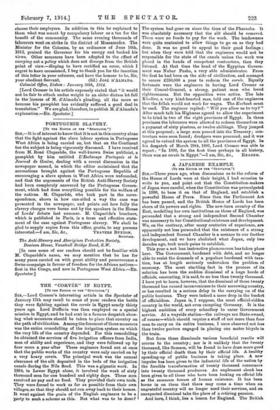THE "CORVEE" IN EGYPT.
[To TDB EOM. OF MIX "SPECTATOR."' SIR,—LOrd Cromer's interesting article in the Spectator of January 17th may recall to some of your readers the battle they were fighting against the cornea in Egypt nearly thirty years ago. Lord Dufferin was then employed on a special mission in Egypt, and he had sent in a famous despatch show- ing what measures should be taken to place that country on the path of civilization. Among the foremost of these measures was the entire remodelling of the irrigation system on which the very life of the country depended. For this remodelling he obtained the services of five irrigation officers from India, men of ability, and experience, and they were followed up by four more a year after These engineers found out at once that the public, works of the country were only carried on by a very heavy cornea The principal work was the annual clearance of the silt deposited in the beds of the irrigation canals during the Nile flood. This was a gigantic work. In 1884, in Lower Egypt alone, it involved the work of sixty thousand men for one hundred and eighty days. These men received no pay and no food. They provided their own tools. They were forced to work as far as possible from their own villages, so that they should not run away back to their homes. It went against the grain of the English engineers to be a party to such a scheme as this. But what was to be done? The system had gone on since the time of the Pharaohs. It was absolutely necessary that the silt should be removed. There were no funds to pay for the work. The landowners were quite contented to allow things to go on as they had done. It was no good to appeal to their good feelings ; but when they were told that the engineers would not be responsible for the state of the canals unless the work was placed in the hands of competent contractors, then they listened. At that time the head of the Egyptian Govern- ment was Huber Pasha, a very able administrator. From the first he had been on the side of civilization, and managed to secure 2250,000 a year to redeem the cornea. Equally fortunate were the engineers in having Lord Cromer as their Consul-General, a strong, patient man who loved righteousness. But the opposition were active. The late Khedive, a very kind-hearted man, told one of the engineers that the fellah would not work for wages. The Kurbash must be used. The engineer replied: " Will you allow us to try? " After much talk his Highness agreed to allow the experiment to be tried in two of the eight provinces of Egypt. In these provinces the labourers were allowed to redeem themselves on a payment of sixty piastres, or twelve shillings. They jumped at this proposal; a large sum poured into the Treasury ; con- tractors were soon found; dredgers were procured; and it was agreed to extend the system to all the provinces of Egypt. In his despatch of March 29th, 1891, Lord Cromer was able to report: "In 1890, for the first time perhaps in all history,
there was no cornea in Egypt."—I am, Sir, &c., READER.










































 Previous page
Previous page